He Saw The Nigerian Civil War From Both Sides And Believes It Was Fuelled By Youthful Exuberance. The Ben Lawrence Interview.
A Neusroom exclusive interview with veteran journalist and former editor of Daily Times newspaper.
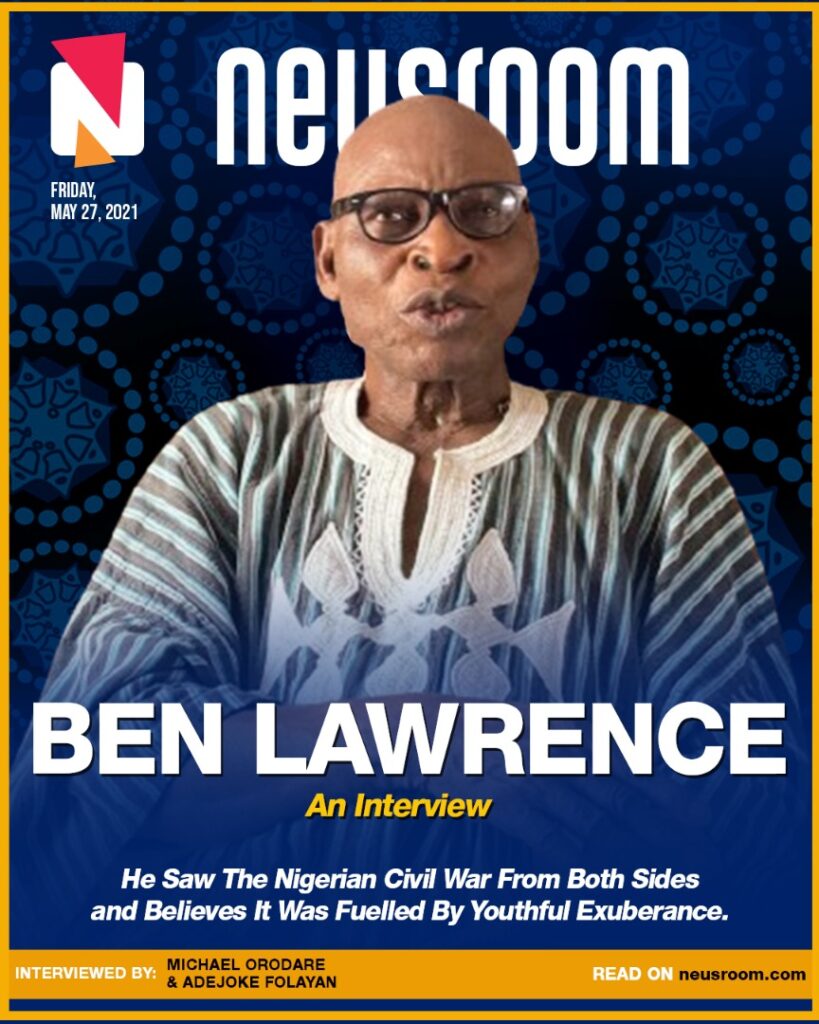
Ben Lawrence, was Editor, Evening Times, Acting Editor and Managing Editor of the Daily Times newspaper in the 1970s. He also worked as the spokesperson of Volkswagen Nigeria. In this interview with Neusroom’s Michael Orodare and Adejoke Folayan, the 84-year-old veteran journalist shares his thoughts on the state of the nation and his journalism career.
Photos by Kingsley Ofuonye for Neusroom
03 June 2021
At what point did you decide it was going to be journalism, and how did the journey start?
It was not by accident. I wanted to be a journalist, right from my school days. I was inspired by Dr Nnamdi Azikiwe, H. O. Davies, Anthony Enahoro, Tunde Aloba, Ebenezer Williams, and other brilliant writers.
I also liked literature, history, and politics myself. I have been following politics since I was 10 years old. I don’t understand how people become politicians overnight these days. We started early in our days because we have elder brothers, cousins, and uncles who were in politics., not the trash you have now. Those were the people in journalism.
How did the journey start?
I attended American Baptist school run by the American Baptist mission. Then I moved to Wesleyan Boys High School, then Metropolitan College Onitsha. I left school in 1956, worked briefly with UAC. I worked in the agriculture department, then the public works department, which is now called the Ministry of Works. I was trained in labour relations there. While I was there, I was stringing for newspapers like Daily Times, Allied Newspapers, Daily Service. That was how most of us started. Eventually, I went into journalism fully in 1961.
If you hadn’t done journalism, what else would you have done?
If I was not a journalist, the other thing that attracted me was law and the military.
In a 2010 interview, you expressed dissatisfaction with the way the country is being managed and said the military handled the country better. What influenced this comment?
I still mean it. When I am talking of politicians, I am talking of proper politicians, not these ones. [Obafemi] Awolowo was a politician, see how he built the West; [Michael] Okpara was a politician, see how he built the east; the Sardauna of Sokoto was a politician, see how he raised Northerners from nothing to something. Not these ones, these people are not politicians, these are hustlers who don’t know a word of politics. Who among them has ideas about how to run Nigeria? That is why I said Ngozi Okonjo-Iweala is a hustler. She brought nothing to Nigeria, all she brought to Nigeria was ruin and people clapped for her. She was there when UAC declared a deficit. UAC after a hundred and something years of operation declared a deficit under Obasanjo’s time. All the multinationals closed down.
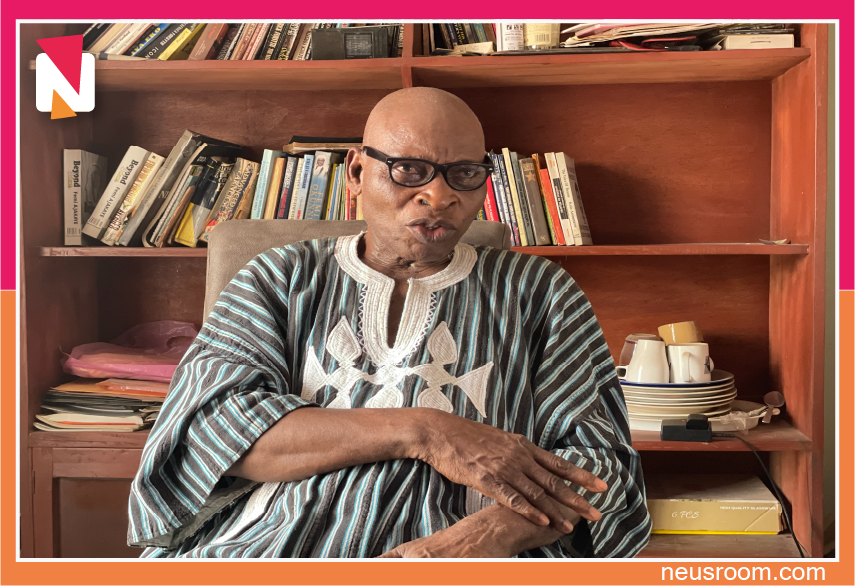
“I don’t blame young Nigerians. You were not given the opportunities to develop the way we did.”
This country was a middle-level industrialised country. Everything is gone! These people have been there for 20 years, what have they brought? Have they brought anything but unemployment?
All the bridges you see now were built by the military. Third Mainland Bridge was started by [Yakubu] Gowon and they stopped it. It was when Babangida came; he completed it.
These people stupidly start to blame the military for nothing. What did the military do wrong? I know some of them were bad. The work you are seeing in Nigeria now was what we did long before you were born, and even what was there before, they destroyed. Just making noise everywhere, stealing your money and there are no ways to check them.
The man there now may have his fault, but he’s honest. He hasn’t got the sort of people like Gowon had who helped him to build Nigeria. We fought a war without borrowing a kobo. We did many things without asking for a loan. Now we are asking for loans everywhere. We were respected in the world. We gave scholarships to our children to institutions overseas to read. We had good times.
When I was leaving school, a job was ready for me. Labour officers will come to your school to interview you to ask where you would love to work. Awolowo and others sustained that thing.
The press is no more there. Advertising companies were very buoyant. Are there still advertising companies? What are they going to advertise? Are there still products? Where are the factories manufacturing anything for them to advertise? In those days when I was in the Daily Times, they were begging us to put adverts in the paper because there was competition. I warned them at that time what was going to happen. The proper journalists foresaw this thing.
What did you warn them about?
Not supporting the democratic government, we warned them about the steps [Olusegun] Obasanjo was taking. See how he destroyed NEPA. These people are jokers! These are not the sort of people that will run a power system to industrialise Nigeria. They left all the burden for [Muhammadu] Buhari to carry. Almost everything Buhari is fighting today, they left behind. Unfortunately for him, he hasn’t gotten the men to help him. If he had boys like Buba Marwa around Buhari, there would be a change. Not these Asiwaju [Bola Tinubu] and all sorts of people; nothing in the head, no plan, no nothing.
The only one who knows a bit about politics among them in the West here is Kayode Fayemi. He’s the only one who knows something about politics. Awolowo would tell you how the Nigeria he wanted in 50 years was going to be and how to get there. [Samuel] Ogbemudia, [Lateef] Jakande, and [Nnamdi Azikwe] Zik would tell you the same thing. That is how you do politics, not this ‘yeye’ politics you have now.
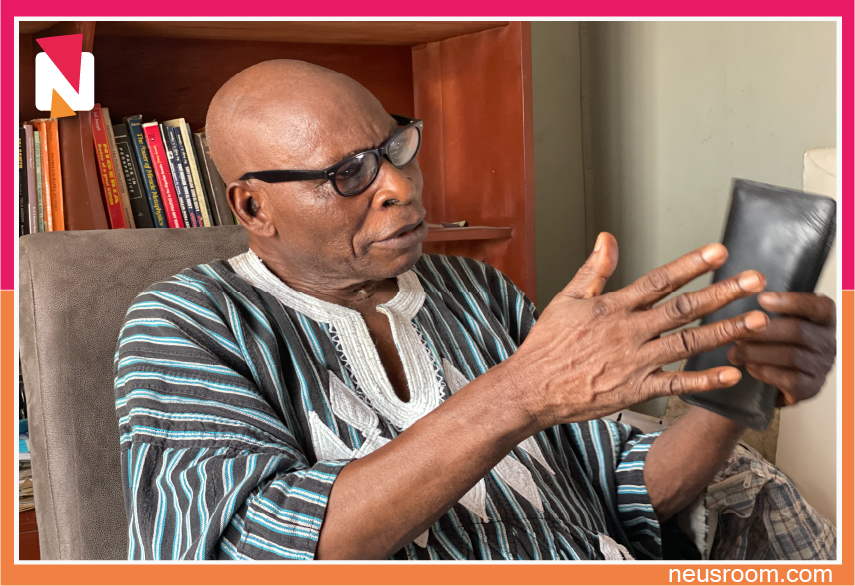
“The Nigerian civil war looks to me now, uncalled for. It was caused by the youthful exuberance of Gowon and Ojukwu.”
You say you have an economic team and they say devaluate the naira, how is that going to help you? If you devaluate the naira and industries here produce, they will produce at a very high cost. How can they compete with the subsidised products coming from China? Here we subsidise people to bring petrol to Nigeria. We are not subsidising; we are only helping middlemen.
Can’t we produce petrol? Do you need rocket science to produce petrol? During the war, Biafrans were producing petrol with nothing. Can’t we do it here?
Close Nigeria up and let us feed ourselves and do everything for ourselves, we will have the solution. We were at the same level as China before, now we are asking them to come and build railways. There are brilliant youths, but there is no motivation. The people with the political will to make you work are not there. The only motivation there is how to steal because your ministers and council members are stealing.
Do you think we would have made more progress under the military?
Let me tell you, I was one of those people who opposed Gowon, I now regret it. The progress we made in nine years under Gowon is indescribable. This country was already semi-advanced. When you get to Ikeja, you can see the tombstones of all those factories that were operating, that is to show you where we were before. When you couldn’t even maintain the roads that they built that time. Lagos-Ibadan expressway and Sagamu-Benin expressway were all built by the military government. All the overhead bridges you have in Lagos and Kano were built by the military. Kano was so developed under Audu Bako. He was just a policeman without a degree.
The ministry of works built all the universities and their structure, not Julius Berger or contractors. We had competent engineers handling these things. Most of our engineers now are helping America and other countries. In those days when we finished schooling, we rushed back to Nigeria to work, to compete. Now all of you are leaving. The civil service is destroyed, it no longer has a structure and Obasanjo called it monetisation. If you want a cleaner now in the civil service, they hire one from outside, whereas the structure was there to take care of those things. The messenger then now called office assistants knew where all the files were and you don’t even have them again. That efficiency is gone. It’s a pity.
Did you ever consider taking a political appointment when you were much younger with your knowledge of how you think the nation could be better managed?
I was in politics. It was politics that attracted me to journalism. I’m a [Kwame] Nkrumahist. See what I am wearing. I was a member of the Nigerian Youth Congress with Ademola Thomas, Otegbeye, Femi Okunnu, and the rest of them. I was a member, with the likes of Dafe, Senator Kunle Oyero, J.B. Omotosho, Tayo Apata, Bola Ige, Maitama Sule. We were all in the youth congress together. We used to hold our meetings in Casino hotel in Yaba. We checked this country and checked missteps. There was a time the three major political parties even directed their younger members to leave the congress because we were too advanced. I won’t blame young people now. You were not given the opportunities to develop the way we did. We started the political activism very early. Femi Okunnu was 34 years old when he became Minister of Works. Enahoro was 44, and he was the Minister of Labour and Information. They were both chosen to represent Nigeria in peace talks during the war. On the other side, look at Ife Agwueke and the others, they were young people but were developed beyond their years. I asked one person recently, he said he was a pastor and he didn’t even know Jakande. He was born and raised here and is in his 40s.
Nigerians are less enlightened than they were 25 years ago. The way the people fought the military 25 years ago, we have not seen it against the civilians that have destroyed you. Well, most of the people who were involved are dead. Many of them moved out of the country. Obasanjo is an ill wind that has blown Nigeria. It is because of him you have all these mediocre on the scene now.
What was your experience of the Nigerian Civil War?
I was about 30 and I saw the war on both sides. The war looks to me now, uncalled for. It was the youthful exuberance of Gowon and Ojukwu, not necessarily the older people that caused the war. Yes, the Igbos were wronged, but they were very tactless themselves. After the first coup in 1966, which was genuine, they didn’t behave well.
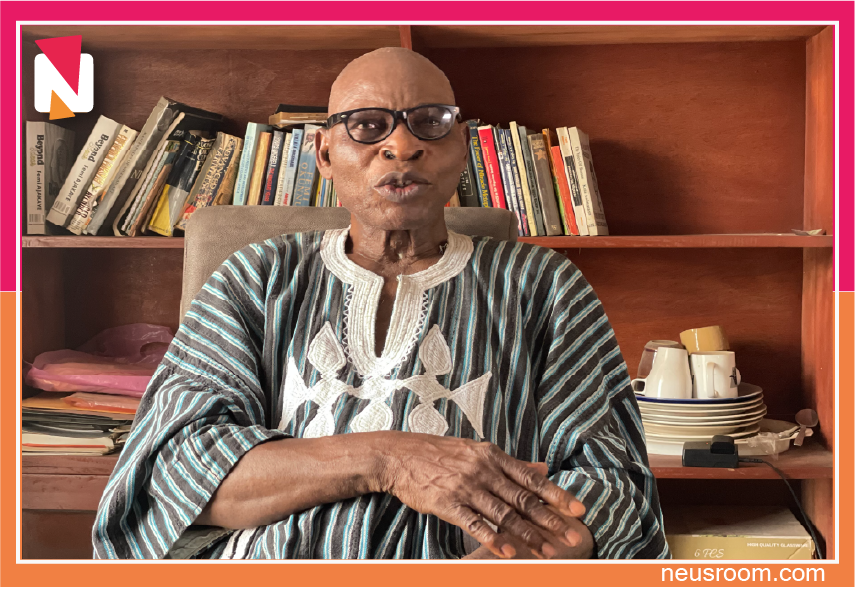
“Nigerians are less enlightened than they were 25 years ago. The way the people fought the military 25 years ago, we’ve not seen it against the civilians that have destroyed you.”
However, during the war, the world respected this geographical unit called Nigeria because of many things. Nigeria’s side was not beggarly and the other side was creating something. Before the war, Awolowo created an economic team in the civil service and announced that ‘we are going to fight this war, what do we do, we must not borrow’ and we didn’t borrow money. They were able to cost how much they would spend every day during the war about two million pounds daily. Imagine what we would have done with that amount of money if we had not fought the war. Even after the war, see the way we reconciled and rehabilitated. You won’t know that we even fought a war.
The problem of Nigeria is the problem of vision. Zik, Awolowo, and others had vision. They were thinking of a Nigeria that could compete with Britain or anywhere in the world. We thought what those white people could do, we could do it too. Our children are proving to be everything in America, Britain, and everywhere. Are they not Nigerians? We have the men, all we do not have now is the organization, which we had before. Nigeria is not mobilized, and you need one man to mobilize the country. Why we were able to hold a successful election on June 12, 1993, was because Nigeria was properly mobilized using MAMSER (Mass Mobilization for Self Reliance, Social Justice, and Economic Recovery). It was my idea. I wrote it and sent it to Babangida, and they adopted it. Although I didn’t play a part in it later because it was hijacked, I am proud that that idea came from me. Mobilize the country, not all these your ‘yeye’ Minister of Information who doesn’t know his right from his left. See the content that was coming out of the Ministry of Information when Tony Momoh was there. I am not praising journalists, but they have always done well in any charge they were given. Name any journalist who failed. Olusegun Osoba and Olabisi Onabanjo did very well in Ogun state. Jakande was a success here in Lagos, Otedola was for a short period. He had no more when he took over, but he was able to keep the state going. He even introduced the taxis, and we were getting water.
Journalists by our training in those days were exposed to thinking and solution, because in the newsroom, you don’t wait for news because you don’t know where your news is coming from and you must publish tomorrow. You cannot say you didn’t get news or there won’t be anything on the air because nothing happened? Something must happen, you must get it.
I am not blaming you people, but your enterprise is so low now. There is no more reporting in Nigeria. Many things happen and I don’t see them in the newspapers and those things are what people would appreciate. You are telling them about America and Afghanistan, yet things are happening around them and you are not pointing those things out.
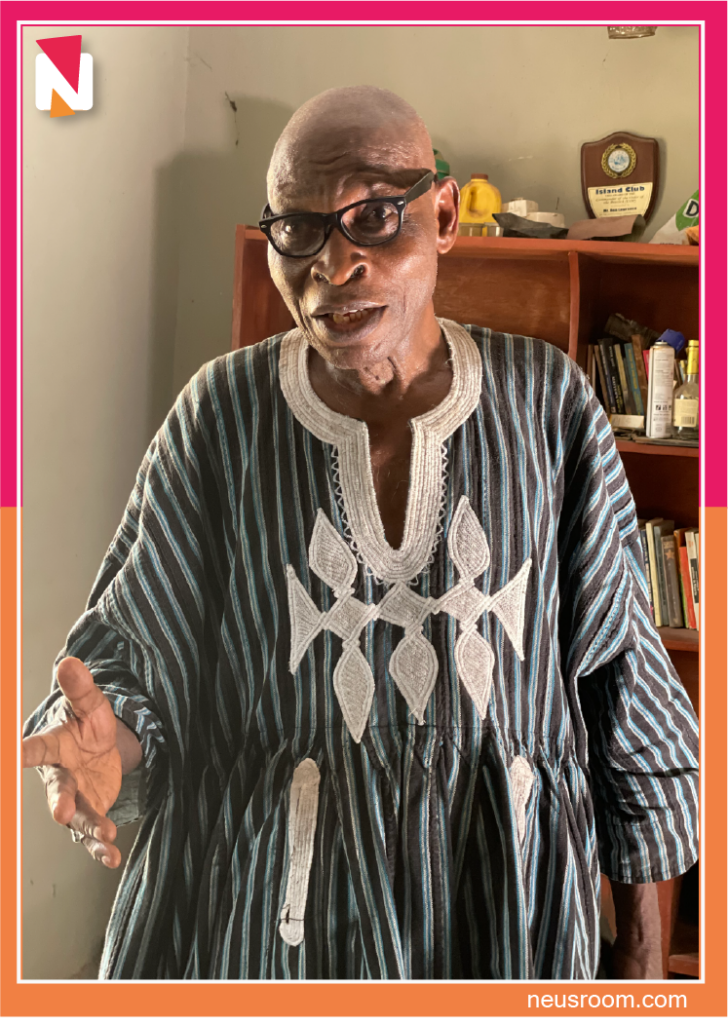
“The Igbos were wronged, but they were very tactless themselves. After the first coup in 1966, which was genuine, they didn’t behave well.”
What role did Nnamdi Azikiwe play in the Civil War?
That is another story. First, he wanted to run away from there; they caught his son with the passport they were sending to him. It was the late Magnus Nweka who became the assistant Inspector General of Police who was Zik’s former Aide-de-camp who packaged that. Zik played along with them on the Biafran side. When they now said they should go for a peace conference, he got there; he came up with how he thought the issue could be settled and both sides could concede, but the Biafrans didn’t accept it.
After the conference, he didn’t go back to Biafra; he stayed in London, and from there he said he was going to Liberia; I think it was a lie. He came with his son; the plane stopped at the airport and Aminu Kano was at the airport. When he now left the plane, he said he wanted a drink. When he came out, people recognized him and the whole place exploded into shouts. The whole country was seized. Gowon now ordered that he must not be allowed to leave.
The late Audu of NTA was one of my reporters. He called me that Zik was in Lagos. The whole of Lagos was upside down and the Biafran soldiers at the frontline were at alert. So Gowon said Zik should come and see him and they delayed the plane. He went to Dodan barracks and everyone came to see him and before they did anything; he said let us pray. Zik was an actor. After prayer, Gowon was explaining to him that his cause was sincere and Zik said okay we would solve it. Then he left, went back to Britain, and started attacking Ojukwu like hell.
So he never believed in the war?
He never believed in the war. Zik, Mbadiwe, and others didn’t believe in the war when all their properties were destroyed because of the war. I learnt Ojukwu’s father died because of the war. He was never in support and he couldn’t stand it.
Who were those giving Ojukwu the support?
If you were an easterner, you would have supported Ojukwu at that time because of what happened. Alvan Ikoku and Eyo Ita were Ojukwu’s chief supporters. Eyo Ita was one of the foremost nationalists Nigeria produced. He was an Efik man; he was not an Igbo man, yet he supported it. In fact, he was the leader of the civilians followed by Alvan Ikoku.
What was the experience like for you as a reporter and an editor in the 1970s?
Before Daily Times, I was in the Allied newspaper, Ghana News Agency, New Nigeria, and the Morning Post.
As a reporter, we competed. We don’t share the news with your competition. Nowadays you share news and press releases, you don’t go for the news yourself. We broke the news, after going to embarrass the police and everybody for stories. Alhaji Babatunde Jose was a super reporter. The government says this, is not news. It’s for everybody, it’s propaganda. The news is the unusual events and things happening around you. The Punch tries a bit and TVC.
Nnamdi Azikiwe was the father of modern journalism in Nigeria. They tried one way or the other to develop journalists, they even established schools. When I left school, there was only one university in the whole of Nigeria, that is the University of Ibadan. It was known as the University College Ibadan then. We didn’t have all these opportunities, but we were able to struggle on our own. A lot of journalists got their degrees from home, studying everything from law to economics. You would be surprised that some big judges in court those days were journalists. Justice Somolu, Sam Agbaje Williams, Emmanuel Fakayode were former journalists. We could stand up to any white journalist because we didn’t feel inferior to them. In fact, we knew better than the American journalists you run to now. I don’t see anything in American journalism.
Did you work as a journalist in the U.S?
Well, I did, one way or the other.
What are the advantages that the present generation has that you think were not available to journalists during your time?
Technology has improved. Even in America in those days they were still using hot metal like we were doing here. We didn’t have the technology, yet we produced better than what we are doing now.
You had to wind the telephone in those days, yet we were able to get news about what happened in Nguru overnight, despite the poor communication. When football matches were played over the weekend, we will get all the results to the reader the next day, yet there were no facilities like this now. You have all these facilities and you don’t know how to use them.
Do you think Social Media and Citizen Journalism are destroying journalism practice?
I think so. I see a lot of things and I just start to laugh. This is not journalism. When you get a story you have to verify, you have to make sure it is true. There is one they’ve sent to me numerous times and they even voice it now. How Zik manipulated things. Pure Lies!
In 1947, I was one of those boys who arranged benches in Benin for Zik, Olorunnibe, and Fela’s mother when they were touring the country and looking for money to go to London. I was already reading newspapers in 1947. I was only 11 years old. When they came back, there was no fight. There was even an election that year. NCNC cleared the four seats of the legislative council in Lagos. Zik, Adedoyin, Olorunnibe, and TOS Benson won.
Awolowo was just even arriving from England at that time. Awolowo came back from England in 1947. He was not even in the show. Awolowo was one of the closest people to Zik, and people didn’t know. They were never enemies. When Awo was in jail, Wole [Awolowo] was living with Flora Azikiwe at the statehouse. They are just misleading people and they say they are professors. Where did you get this thing from? Which newspaper? When were you born? Who was your father? Were they circulating newspapers in your place at that time?
In 1973, Daily Times reported that one Isiaka Busari aka Mighty Joe, an armed robber, was sentenced to death and killed by firing squad at the Lagos Bar Beach.
Daily Times never reported that Mighty Joe was sentenced to death as an armed robber. Mighty Joe was one of those boys following Fela and the rest of them. He ran into trouble with the police and they killed him. Did he even face court?
In one of the newspaper publications reviewed at the National Archives. A report on the front page of Daily Times in 1973 says “Mighty Joe Killed For Armed Robbery”. But there have been claims that he was never an armed robber.
Who was an armed robber then? If you are caught with a knife, police will arrest you and charge you for armed robbery.
You can only report what the police presented to the tribunal. They just wanted to eliminate him. I wouldn’t say he was an armed robber, but he was a strong-armed man. I know him very well and he knew me. He couldn’t even try me. I knew him as a journalist.
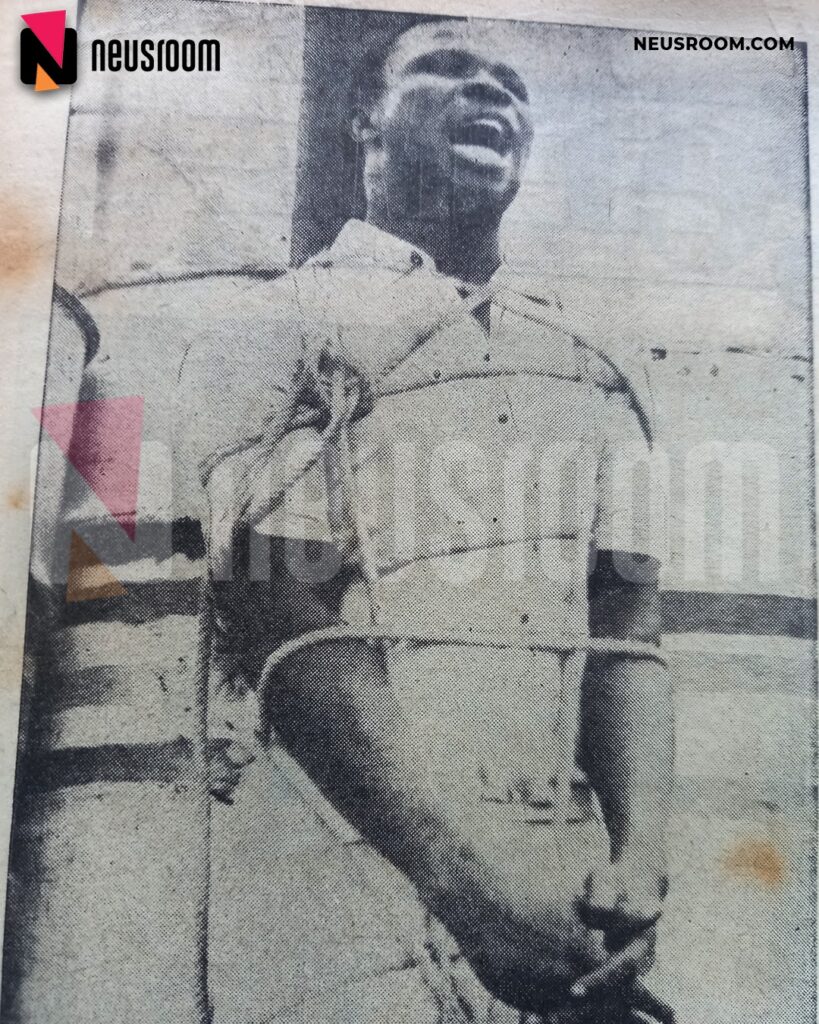
Mighty Joe, executed in 1973 for armed robbery at the Lagos Bar beach. Photo: National Archive.
How did you meet him?
We go to clubs together. Journalists in those days were not sitting at home, we were moving around for news. We knew all the crime families in Mushin and all those places.
Could he have been a victim of a conspiracy?
I don’t know, but I think they wanted to eliminate him because he was one of the people they considered a nuisance. Long after that, Fela’s case came. Fela’s activism had started at that time. He was eliminated with Oyenusi and Folorunsho. Those were robbers. They were killed in ‘71 and he was in ‘73.
If you were a publisher of a Nigerian newspaper today, who are those from old and new generation, you would like to have on your team?
There are only a few left. Taiwo Obe is one of them, I trained him about 40 or more years ago. Most of the boys I trained are no longer here, they are all in America. Some of them set up newspapers. Some are even dead.
Aside from Mr. Taiwo Obe, who else?
I would get Lanre Idowu, Tunde Thompson, Muyiwa Adetiba.
The list is so scanty. Is it that there is no quality among the younger generation?
You decide that for yourself. I am talking about people I know. I am not only familiar with their works; I knew they were journalists and are journalists. You read the newspaper now there are lots of grammatical errors, unchecked stories and they beat their chests. Babatunde Jose will sack you right away. It was a business; we were living on what we wrote. The government didn’t help us.
Daily Times was doing very fine based on history, but suddenly it went down, what went wrong?
It was deliberate, Obasanjo killed the Daily Times! In 1975, after Murtala Mohammed took over, Obasanjo organised with some boys to cause disquiet in the Daily Times. Unfortunately, some very people dear to me were involved like Kolapo Ogunsanwo. They used that time to purge many good people from the Daily Times. They brought government people inside. Dele Cole was good; he was brought in as the Managing Director, but Daily Times was not as strong as it was under Jose. It was still strong, but when the Daily Times got messed up was during the First Republic under Shehu Shagari when I was the editor. They brought all sorts of people.
And you didn’t challenge all those things?
How do you challenge it? When some people with you were dancing to their tunes to get favours and positions. After that, Osoba came and tried to stabilise it, but we had a personality clash. I left the Daily Times because of a personality clash with Osoba. We are still very good friends, but we had a personality clash back then. A lot of other people left.
Why did they leave?
It was not the same Daily Times they started with. People would resign from the Central Bank at that time to work with Daily Times.
“I left the Daily Times because of a personality clash with Osoba.”
Was the government suppressing the truth, or what was the government doing to influence this?
It was a self-inflicted wound. The mediocre were dancing to the government for promotion. I don’t want to mention names. They set up a board. One Shango, a typist with New Nigeria before, because he was the publishing secretary of the National Party of Nigeria (NPN), was on the board. Alhaji Abiola Ogundokun, these were the people on the board for the Daily Times during Shagari’s times. The board did all sorts of appointments that were turning things upside down, but the last Daily Times we had was under Osoba. After he left, we didn’t have Daily Times again.
What do you think about those aspiring to succeed Buhari?
Kayode [Fayemi] will be a good choice because he understands politics.
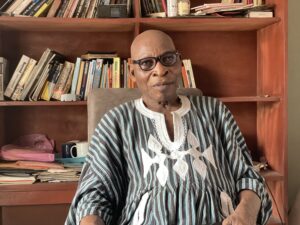
“If Olusegun Osoba was still young, he would have been a good replacement for Buhari.”
Do you think he can make a better president than Buhari?
It depends because some of the best people in Nigeria have never gotten to that position.
What about Prof Yemi Osinbajo?
He has nothing at all, he’s just going up and down. Look at his debate with Peter Obi that time, it was watery.
What about Peter Obi?
No. They have cheapened this position in Nigeria. You know what the soldiers did very well. They had proper training. To be a lieutenant, you must have undergone a lot of training, including human management. People with Ph.D.’s cannot do what they did with human management and problem-solving. Imagine making Wole Soyinka president. I don’t see anyone who can take after Buhari, most people there are mediocre. If Olusegun Osoba was still young, he would have been a good replacement. He had the political know-how, but now we are old.
Does that mean there is no form of political mentorship to raise new leaders?
I don’t know, but they raised us. Even the ones we were trying to raise in journalism, all of them left. There is a lot of depopulation of manpower in Nigeria. A lot of people have moved away and they are doing astonishingly well overseas.
Nowadays, university graduates are political thugs. In those days, Uche Chukwumerije and Dapo Falase were youth leaders right from their university days. ‘Ali must go’ was the last time we had anything about student activism in Nigeria. After then, the politicians came and watered everything down.
Most leaders don’t know how to reach the average person, they all want to be ‘oga’. Sanusi Lamido Sanusi, the former Emir of Kano, can be a good president of Nigeria. These are people who know about governance. Can you compare Sanusi Lamido to Tinubu?
What are your thoughts on Dele Giwa’s death?
I don’t know who killed him, to begin with, but Dele was my younger brother. We were very close. He used to fall back on me when he came back from the US because he knew me. He went to Concord with Abiola and did very well there, came out, and started Newswatch. I think Dele had problems even within his organisation. I’m just speculating, I don’t have the facts, but I don’t think Babangida would have killed him. He would have arrested him or jailed him if he had any issues. Chris Omeben, the late Deputy Inspector General of Police was my classmate, and that man was an angel and a good investigator, but you know Nigerians play politics up and down and they claimed Omoebhen covered everything up. I want to say I don’t know what happened. There must have been some collusion with some soldiers and the intelligence officers. Many things happen that the leader won’t know. For example, they arrested Dr. Falomo and Adekunle Ajasin and Abacha was not aware. Once he found out that Adekunle Ajasin was not guilty, he promptly released him.
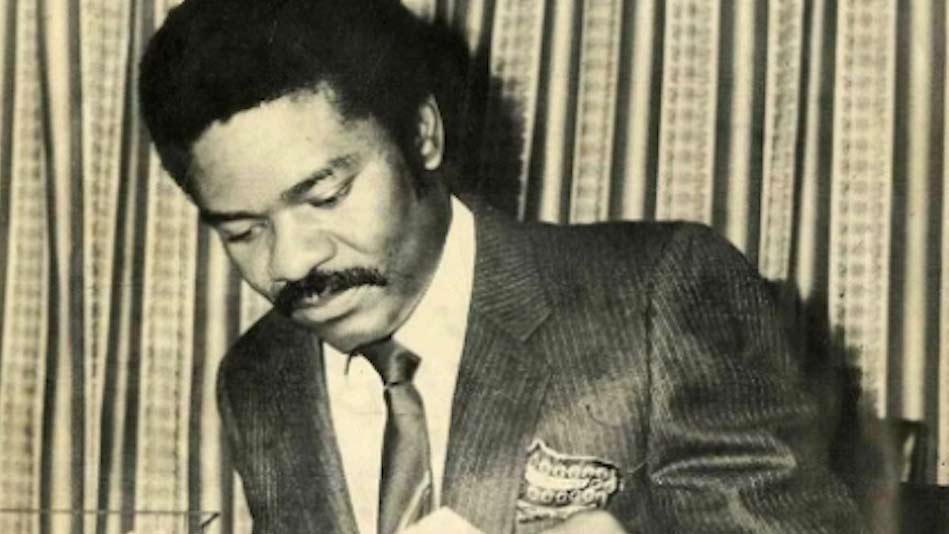
“ I don’t have the facts, but I don’t think Babangida would have killed Dele Giwa.” Photo: Guardian Nigeria.
But NADECO said Abacha was a tyrant?
Some members of NADECO like Anthony Enahoro, Prof Bolaji Akinyemi were good, but some of them were looking for political positions, others were double agents. Prof Bolaji Akinyemi said he regretted it and the matter should have been handled otherwise. It was the Yorubas who placed Abacha there. They were the ones who potted against Ernest Shonekan. Gani Fawehinmi and Akinyemi called on Abacha to take over, but when he was distributing portfolios and they weren’t nominated, they became vindictive. I’m not saying Abacha was an angel, but the looting allegations were propaganda and journalists did not have the guts to investigate properly.

Sani Abacha, Nigeria’s former military dictator, accused of looting billions of dollars and died in 1998 before spending his loot.
Even the 2.8 billion loot was exposed by my friend, Abidina Coomassie. When we released the story, it confused the people in the government. He lost his life when he exposed the loot that was taken under Abdulsalam. Then peoples like Falana and the others came out of nowhere and started their activism. They are all crooks. Obasanjo knows their secrets that is why he deals with them the way he does.
Gani fought, but he was not special. We have fought before him. I was detained during the war along with Yakubu, Lateef Jakande, We fought for conviction, not for money.
How would you describe your upbringing?
I was from an enlightened family. My father was an assistant district officer in the colonial government before he died. I am from Ondo town in Ondo state. My great grandfather was Oba Arikulasi of Ondo. My grandmother was from Ipetu-Ijesha and the mother of Arikulasi was from Ife. I have no connections with the East.
My father was an administrator and was widely travelled. He was to be a Catholic priest, but he left the seminary and enlisted in the army during the first world war. He was very brilliant and educated.
My father was also well to do but unfortunately, he died at 50 and left behind young children. He died in 1942 I was about 6 years old and I just started schooling then.
I had four children, although one died of a liver problem. The youngest are twins. The oldest, Shade, is a top director at Target. She is an American citizen. She doesn’t even think about Nigeria at all. Their mother is well educated, although she is retired too. She had her Master’s degree from Howard University in 1971 and another Master’s from the University of Chicago. She was the assistant director of the Nigerian Institute of Journalism from 1976 to 1985. Then she joined The Guardian newspaper because she was a journalist in America before she moved here. She was in United Press International. She was a broadcast teacher at the NIJ and the University of Lagos before she went back to the US.
What are your views about the #ENDSARS protests by the youth?
Youth is the age of protest. I have been condemning Nigerian youths for some time; fortunately for the first time in 25 years, young people came out to request something from the government. When we were that age, we had changed this country many times. ENDSARS was a good idea with poor planning.
ENDSARS was smart, but they should have asked for other things at the same time. I don’t blame them, they have no experience. Political thought in Nigeria has been dead since Obasanjo came. The last Minister of Finance we had was Anthony Ani under Abacha. Abacha ran a damn good government!


One Comment